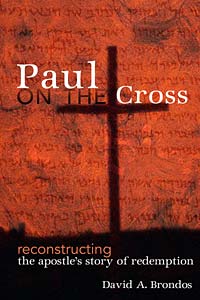David Brondos: Paul on the Cross
 David A. Brondos, Paul on the Cross: Reconstructing the Apostle’s Story of Redemption (Minneapolis: Fortress, 2006), 241 pages, ISBN 9780800637880.
David A. Brondos, Paul on the Cross: Reconstructing the Apostle’s Story of Redemption (Minneapolis: Fortress, 2006), 241 pages, ISBN 9780800637880.
It is always healthy to question what we think we know about the Bible, for the simple reason that it is all too easy to smuggle traditional readings into a text that often should be read on quite different terms. As the most explicitly theological section of Scripture, Paul’s letters deserve to be rethought more often and more rigorously than any other selection of biblical writings. David Brondos’ Paul on the Cross is one of many recent attempts to rethink Paul, and for that reason alone, it is worthwhile reading. Whether Brondos ultimately makes his case, of course, is a separate question.
Brondos’ thesis is a startling one: Jesus’ death and resurrection are not acts of power that destroy the power of death, and neither do they provide for a sacrificial offering in place of our sin. Rather, Jesus’ resurrection is God’s response to Jesus’ faithfulness (even unto death), and as such (according to Brondos) it represents the guarantee of the divine promises of salvation to us. Brondos does not express his exact understanding of how this works very clearly, but the gist of his understanding is that the resurrection was an act of vindication which backs up God’s promises to save us through some other (eschatological?) mechanism. The way Brondos works Jesus’ faithfulness into his understanding of salvation obviously trades in a notion that is currently very popular. (Whether it has the support that others purport to find in Paul’s arguments is another matter.)
One of Brondos’ favorite arguments against the usual forensic (satisfaction) and classical theories of atonement is that these theories are completely unlike anything we find in other streams of first-century Christianity. This means, according to Brondos, that one must suppose Paul to have been enormously creative to have fashioned one or both of these theories from the material that he received from the other apostles. It is better to suppose, he thinks, that these understandings are fundamentally wrong. Brondos, in fact, expresses this disjunction in terms of a direct comparison between the apostolic kerygma, on the one hand, and these theories of atonement (as attributed to Paul by virtually all modern readers) on the other hand.
The disjunction between Paul and his contemporaries is obvious—but does it count for as much as Brondos wants it to count? After all, there are many other issues on which Paul’s maverick ways are all too apparent—e.g., his understanding of Gentile inclusion apart from circumcision was probably just as much of a quantum leap for non-Pauline Christians as any theory of atonement would have been. It is also questionable whether we may compare Paul’s doctrine of atonement (whatever it was) with what is disclosed in the kerygma: the point of 1 Corinthians 3 seems to be that “Jesus Christ” (meaning the kerygmatic narrative of Christ’s death, burial, resurrection, etc.) is the foundation on which one should build one’s faith system, so that the kerygma represents the building blocks of the faith, but it does not represent the whole theological truth about the Christ event. Thus it is a category error to compare the components of a more fully developed interpretation of the kerygma with the kerygma itself.
Category: In Depth, Summer 2009


